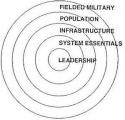Radical cleric Abu Qatada, who is being tried on terror charges in Jordan, on Tuesday denounced as "void" the declaration of a caliphate by Sunni jihadists in Iraq and Syria.
"The announcement of a caliphate by the Islamic State (IS) is void and meaningless because it was not approved by jihadists in other parts of the world," Abu Qatada wrote in a 21-page document published on jihadist websites.
The Islamic State of Iraq and Syria (ISIS), which has been fighting in neighbouring Syria and Iraq, on June 29 proclaimed a "caliphate" straddling both countries and headed by Abu Bakr al-Baghdadi, who now calls himself Caliph Ibrahim.
"This group does not have the authority to rule all Muslims and their declaration applies to no-one but themselves," said Abu Qatada.
"Its threats to kill opponents, sidelining of other groups and violent way of fighting opponents constitute a great sin, reflecting the reality of the group," wrote the Palestinian-born preacher.
Abu Qatada, who has repeatedly criticised the Islamic State, urged other Muslims against joining the Sunni jihadist group.
"They are merciless in dealing with other jihadists. How would they deal with the poor, the weak and other people?"
Jordan's jihadist movement is generally dominated by anti-IS groups that support Al-Qaeda and its Syrian ally, Al-Nusra Front.
Abu Qatada's statement came after leading Jordanian jihadist ideologist Issam Barqawi, known as Abu Mohammed al-Maqdessi, denounced the declaration of the caliphate on July 2.
Once mentor to Iraq's now slain Al-Qaeda leader Abu Musab al-Zarqawi, before the two fell out over ideological differences, Maqdessi told the IS to "reform yourselves, repent and stop killing Muslims and distorting religion."
Abu Qatada, who was deported from Britain in July 2013 after a 10-year legal battle, was acquitted last month of plotting a 1999 attack on the American school in Amman.
But he remained in prison, facing another terror charge of plotting to attack tourists in Jordan during millennium celebrations.
N Ireland is not the Middle East and the dynamics are very different, but in both cases the dynamics are in my opinion primarily not religious.










 ) pattern is that people who are recruited into "religious" groups engaged in combat (terrorism being just a tactic within a broader context of combat), generally know very little about their own, professed religion. So, what can we tell from this pattern?
) pattern is that people who are recruited into "religious" groups engaged in combat (terrorism being just a tactic within a broader context of combat), generally know very little about their own, professed religion. So, what can we tell from this pattern? .
.


Bookmarks